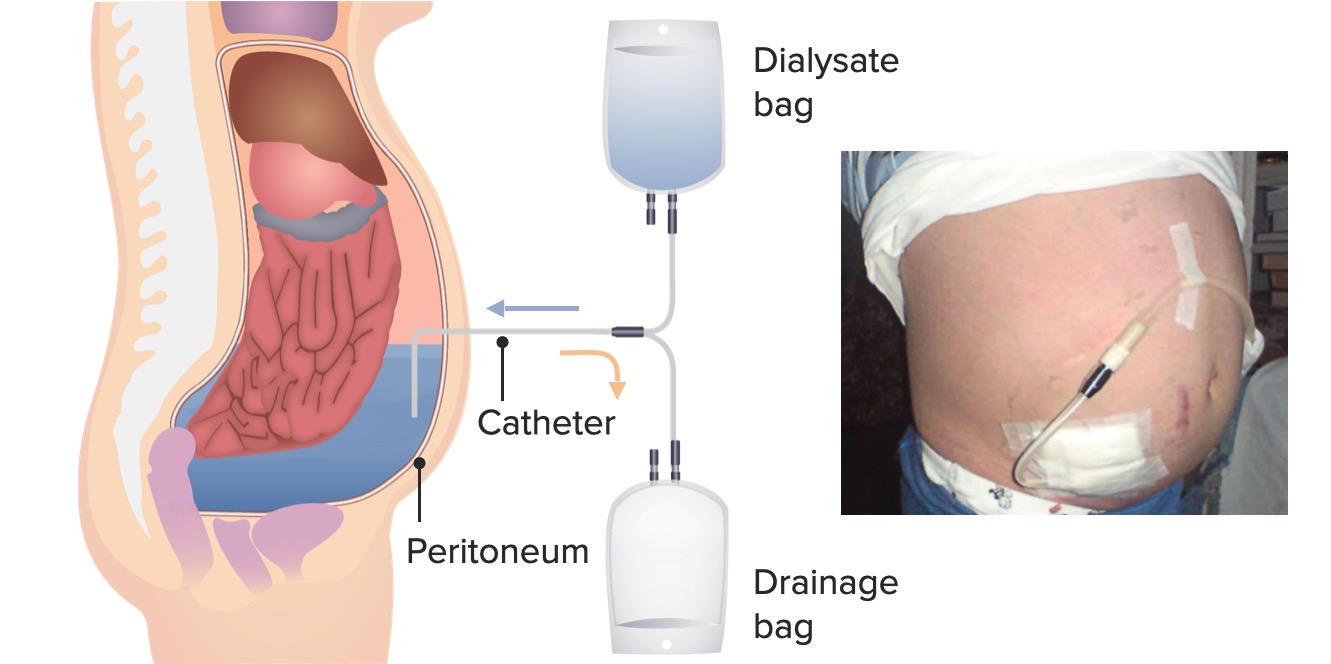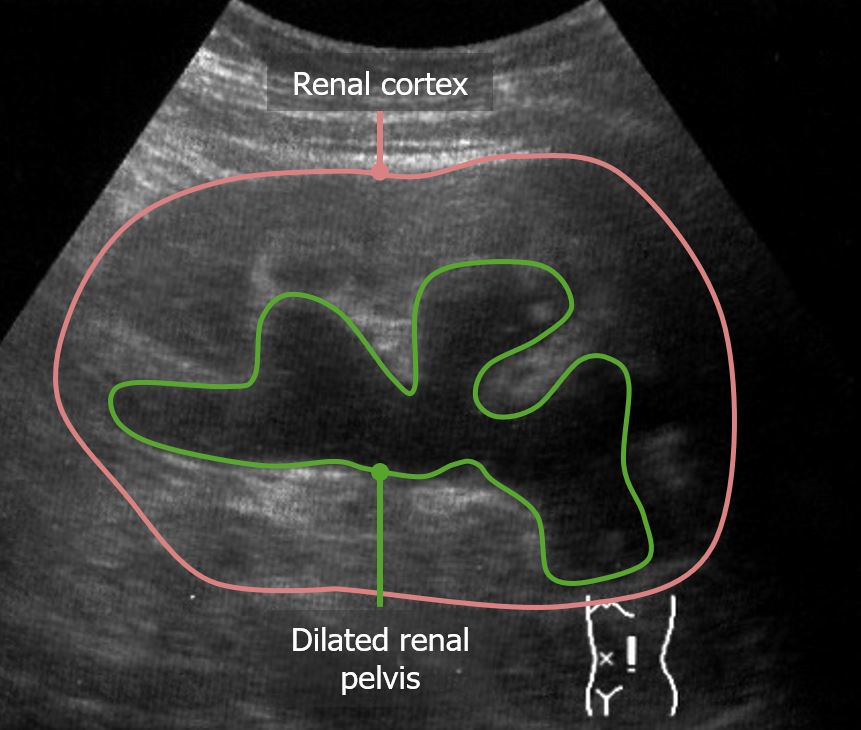Playlist
Show Playlist
Hide Playlist
Chronic Kidney Disease (CKD): Interventions to Slow Down Progression with Case
-
Slides Nephrology Chronic Kidney Disease.pdf
-
Reference List Nephrology.pdf
-
Download Lecture Overview
00:01 Okay, so it's not all doom and gloom when it comes to chronic kidney disease. 00:05 We've talked about the risk factors for progression and that there are certain populations who are going to progress more than other people but although there is progressive nephron loss and we can't necessarily avoid that. 00:16 There are some interventions that we can do in order to slow the rate of progression and help our patient and it's critical to understand what those are. 00:24 Let's move on to a clinical case in order to illustrate our point. 00:28 So you're seeing a 56 year old gentleman who has stage 3A chronic kidney disease due to diabetic nephropathy. 00:34 His physical exam is remarkable for a blood pressure of 148 over 90. 00:39 His serum creatinine is 1.4 milligrams per deciliter. 00:42 We see that that's elevated and it gives them an estimated GFR a 50 mils per minute provided by ckd-epi. 00:49 He has over proteinuria estimated at 402 milligrams by spot albumin-to-creatinine ratio so we can see that that's elevated as well. 00:57 And as hemoglobin A1c is 6.5 percent on insulin taking both lantus and novolog. 01:04 So the question is what is the next logical step in the management of this patient CKD? Let's go through our clinical case and see if we can answer that question. 01:16 So one of the things to look at are his risk factors for progression. 01:20 Remember, he has diabetes mellitus, which is one of those diseases that actually progress kidney disease. 01:27 And he's a male gender. 01:28 So those are two risk factors that we think about. 01:30 He also has uncontrolled blood pressure and proteinuria. 01:34 So these are all concerning things that can accelerate his risk for disease progression, but I think what's interesting is that is hemoglobin A1c, which is measuring is diabetes is actually quite controlled on his current therapy at 6.5%. 01:47 So again, what's the next logical step in the management of this patient CKD? We can either add an oral hypoglycemic like glipizide in efforts to reduce his A1c to less than 6%. 02:01 We can add a calcium channel blocker like amlodipine to effectively control his blood pressure and suppress his albuminuria, or we can add an ACE inhibitor in order to control both as blood pressure and suppresses albuminuria. 02:14 Which one do you think it is? Well, let's go through them. 02:19 If we added an oral hypoglycemic, does that make sense? Remember, He's already on insulin therapy. 02:24 His A1C was well controlled. 02:26 I would love to have a patient who had an A1C of 6.5% So there's really no data that reducing A1C below 7% is going to improve outcome. 02:35 So we know number one is wrong. 02:37 Number 2. should we add a calcium channel blocker like a dihydropyridine like amlodipine took control of blood pressure? Well, that's not correct either and although dihydropyridine calcium channel blockers are wonderful at controlling blood pressure amlodipine is huge in my armamentarium for blood pressure agents. 02:54 They don't suppress albuminuria, and that's what we're trying to target in addition to blood pressure. 03:01 So adding an ACE inhibitor or an ARB Angiotensin receptor blocker can not only help to control this gentleman's blood pressure, but it can suppress the albuminuria by antagonizing the renin-angiotensin system helping to reduce proteinuria and slow the progression of this gentleman's chronic kidney disease and that's what we want to do. 03:23 Okay, let's move on to interventions that can slow the progression of chronic kidney disease. 03:28 One of the most important interventions is having good blood pressure control in our patients. 03:33 So our goal blood pressure in our patients is less than 125 to 130 systolically, over less than 80 diastolicly using standard routine clinician office measurements. 03:45 Now when our patient is at home, and they're doing either home blood pressure measurements or continuous ambulatory blood pressure monitor. 03:53 That go lowers a little bit because they're in their natural environment. 03:57 So that goal blood pressure really should be less than 120 to 125 for a systolic and less than 80 for a diastolic. 04:04 Now it's interesting because lower goals have been proposed for people who have a vert proteinuria to even less than 125 over 75, but really when looking at the data, there's no convincing data to really support this so really our goals are what I've outlined above. 04:22 Now another intervention that we can do to slow progression is use use of renin-angiotensin-aldosterone Inhibitors or RAAS antagonism. 04:30 So medications like ACE inhibitors or Angiotensin receptor blockers are very important. 04:35 They can slow progression of chronic kidney disease in patients who have proteinuria. 04:40 So again, those patients who have albumin greater than 30 milligrams per day or their protein levels of greater than 150 milligrams per day. 04:46 It's critical to have these medications on board. 04:51 And Remember, it's interesting because ACE inhibitors and ARBs have an independent effect independent a blood pressure lowering that really helps our patients in terms of reducing the progression of their disease. 05:02 And again, if you think about kind of how these agents work, they decreased glomerular capillary pressure. 05:08 Why is that? Because they're working on the efferent arteriole, right? They cause vasodilation there and that lowers the glomerular capillary pressure and in so doing that's going to reduce hyperfiltration and it also has actions to mitigates tubulointerstitial fibrosis, so these drugs are really critical in our patients particularly who have protein direct diseases. 05:28 Sodium-glucose cotransporter 2 (or SGLT2) inhibitors can be used for individuals with chronic kidney disease and proteinuria, even in the absence of diabetes. 05:41 These drugs act by blocking absorption of glucose in the proximal tubule, leading to excretion of glucose in the urine. Additionally, they have multiple renoprotective effects, including reducing intraglomerular pressure and hyperfiltration, which can help reduce proteinuria and renal function decline. 06:02 Other interventions that can help are controlling phosphorus levels. 06:05 Remember how we talked about phosphorus and how it stimulates that FGF-23. 06:09 So we want to ensure that phosphorus levels are low. 06:12 So we ask our patients for dietary discretion. 06:14 We advise them what foods are high in phosphorus and they have to be very cognizant to ensure that they don't take too much of those foods in things like dairy and nuts and high protein meals. 06:25 We also can use agents like phosphorus binders. 06:28 So these are big giant pills that are patient has to take either before or right with the meal and that actually binds the phosphorus and eliminates it through stool. 06:37 But it is very cumbersome for a patient to do sometimes these patients are taking four or five binders at each meal. 06:44 So I do want you to be cognizant when you're asking your patients to do things how difficult sometimes it is for them to do this. 06:52 We want to treat their metabolic acidosis. 06:54 Remember, these people develop acid base abnormalities because they end up with a decrease decrease in the ability to handle acid so we can give them things like sodium bicarbonate supplementation, and we just talked about before how that's been shown to slow the rate of loss of GFR over time. 07:09 So it's an important area to really correct and we want to counsel our patients to stop smoking. 07:15 I cannot underscore how important it is to really approach your patient holistically and really help with lifestyle modification. 07:22 I give all the resources possible to my patients whether they're smoking cessation groups whether there are people that they can talk to you about quitting smoking. 07:30 This is critical to really help them in terms of preventing their disease progression. 07:35 We can correct their anemia. 07:36 Remember we talked about how our patients have a decrease in Epo production from their kidney. 07:41 We can actually give them a erythrocyte stimulating agents or ESA like Epoetin alfa. 07:47 That actually helps to produce those red blood cells. 07:49 So they don't have to feel anemic and terrible. 07:52 We're very clear about when we want to start this so we don't really start this until that hemoglobin is less than 10 grams per deciliter and we want to maintain that hemoglobin between 10 and 11.5 grams per deciliter. 08:02 The reason being is that if we were to ever correct that hemoglobin to the higher or normal range that patient might be at risk for either neoplasms or an increase in cardiovascular events. 08:11 So we do have tight control of their anemia when they're on these ESA's. 08:16 We also want to think about using HMG-CoA reductase Inhibitors or statins. 08:21 Remember our patients typically have lipid abnormalities and using statins may be associated with slowing of GFR, but they're important again to reduce these cardiovascular risks that are really prevalent in our patient population. 08:35 We also want to counsel our patients to have a lower protein diet. 08:39 The benefit is really seen more in proteinuric diseases. 08:42 So in patients who tend to have greater than 1 gram of protein in their urine per day. 08:46 And there's a potential in that patient population to slow the rate of loss of GFR over time. 08:52 The goal that we usually achieve or what we try to strive for is about 0.6 to 0.8 grams per kilogram of protein per day. 09:00 That's not a lot of protein. 09:01 So in that case, I usually have my nutritionist involved so that they can follow my patients to ensure that the protein that they're eating is high quality and that they don't become malnourished. 09:12 Another important aspect is to treat the actual underlying disease. 09:17 So if I have a diabetic, I've got to have strict glycemic control. 09:20 I want that blood glucose or hemoglobin A1c to be less than 7%, because we know by randomized controlled trials that is going to result in improved renal outcomes. 09:30 And for my patients who have glomerular diseases other than diabetes, then I want to think about immune targeted therapy or immunosuppression to treat that underlying disease.
About the Lecture
The lecture Chronic Kidney Disease (CKD): Interventions to Slow Down Progression with Case by Amy Sussman, MD is from the course Chronic Kidney Disease (CKD).
Included Quiz Questions
In patients with diabetes mellitus, what is the target level of HbA1c recommended to delay the progression of CKD?
- HbA1c ≈ 7%
- HbA1c ≈ 5.5%
- HbA1c ≈ 8.5%
- HbA1c ≈ 9%
- HbA1c ≈ 8%
What is the first-line treatment for hypertension in patients with proteinuric CKD?
- ACE inhibitors/angiotensin receptor blockers (ARBs)
- Loop diuretics
- Calcium channel blockers
- Thiazide diuretics
- Beta-blockers
Which lifestyle modification should be recommended for patients with CKD?
- Smoking cessation
- High-protein diet
- High-phosphorus diet
- High-fat diet
Which of the following is NOT part of the routine management of CKD?
- Prednisolone
- Smoking cessation
- Statins
- Low-protein diet
- Low-phosphorus diet
Which of the following management goals is recommended to delay the progression of CKD?
- Blood pressure control with a goal of 125–130/80 mm Hg or lower
- Glycemic control with a goal HbA1c level of 6% or less
- Protein intake restricted to 1.5 g/kg/day or less
- Use of erythrocyte-stimulating agents to treat anemia and maintain a hemoglobin level of 13–14.5 g/dL.
Customer reviews
5,0 of 5 stars
| 5 Stars |
|
5 |
| 4 Stars |
|
0 |
| 3 Stars |
|
0 |
| 2 Stars |
|
0 |
| 1 Star |
|
0 |





